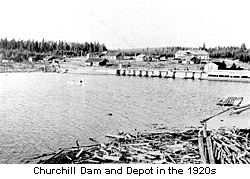Helen Hamlin (1917-2004), author of Nine Mile Bridge: Three Years in the Maine Woods and Pines, Potatoes and People: A Story of Aroostook, was born Helen Leidy in Fort Kent. She developed a great love of the wilderness and adventure as the daughter and granddaughter to Maine fish and game wardens. She summered on Cross Lake at her grandfather’s camp.
By the early 1930s, approximately twenty families lived permanently at the depot, including those of the superintendent, paymaster, master mechanic, truck drivers, Lombard operators, boat operators, scalers, camp superintendents, and many more.
At the height of its operation, thousands of people were processed through the depot annually. This meant that additional structures were needed for a school, houses, offices, a power house, gas tanks and others.
After high school in 1935, Hamlin studied at the Madawaska Training School in Fort Kent (now the University of Maine-Fort Kent). It was the third Normal School established in Maine, designed to instruct teachers how to cope with language issues in the Saint John Valley where most of the students spoke French and did not speak English.
Helen was fluent in French, and she advocated for the bilingual community. She was a firm believer in teaching the students English as their official school language but she also spoke of the importance of their not losing their native tongue.
She requested a teaching position in the backwoods after her graduation in 1937. Given the opportunity, she became the first woman schoolteacher at the Churchill Depot lumber camp settlement, an outpost along the Allagash River on Churchill Lake, some 100 miles as the crow flies, 129 miles today by road from Fort Kent. Helen had been told that she shouldn’t go up to those areas because she was a woman, but she did go. She was very popular among the timber men, and married fish and game warden Willis “Curly” Hamlin in 1938. They braved two extremely tough winters in a remote cabin at Umaskis Lake, surviving on their provisions and their wits.
 Her first book, Nine Mile Bridge: Three Years in the Maine Woods, was published in 1945. Long out of print, Island Press republished Nine Mile Bridge in 2005. Andrew Vietze in Down East Magazine wrote in his review of the book, that besides the telling of daily life in the Maine woods, Hamlin’s work serves as a history book, recounting stories and pictures of the history of the area. Some stories passed down only through oral histories are not found in any other works. She describes native terminology in the book, and describes how squatters founded Seven Islands and that the Allagash settlement was refuge to English colonists during the war of 1812 (Vietze, 43). Only after her first pregnancy and her husband’s failing health did they reluctantly leave the woods. Shortly after leaving Churchill, Helen divorced Hamlin.
Her first book, Nine Mile Bridge: Three Years in the Maine Woods, was published in 1945. Long out of print, Island Press republished Nine Mile Bridge in 2005. Andrew Vietze in Down East Magazine wrote in his review of the book, that besides the telling of daily life in the Maine woods, Hamlin’s work serves as a history book, recounting stories and pictures of the history of the area. Some stories passed down only through oral histories are not found in any other works. She describes native terminology in the book, and describes how squatters founded Seven Islands and that the Allagash settlement was refuge to English colonists during the war of 1812 (Vietze, 43). Only after her first pregnancy and her husband’s failing health did they reluctantly leave the woods. Shortly after leaving Churchill, Helen divorced Hamlin.
She married Robert Lennon in 1947 and the couple had three children, Michael, Catherine and Christopher. In 1948, her second book Pines, Potatoes and People: A Story of Aroostook was published under her former husband’s name, Hamlin. This book is similar in style to her first book and simply tells anecdotal stories. One such account is the origin of the potato’s nickname S.P.U.D. that stands for the Society for the Prevention of Unwholesome Diet. Wheat growers in England feared the potato as competition for the wheat trade. Her stories of the people, places and the potatoes there, capture their uncomplicated beauty.
Robert’s studies took the family out to Michigan during the 1950s. To help the family financially, Helen painted portraits in her house, and some of paintings hung in shows in Washington D.C. She studied at the University of Wisconsin, regaining her teaching certificate and taught French to schoolchildren, high school and college students again. She traveled abroad extensively and worked as a translator for the U.S. State Department in Africa. Hamlin moved back to Maine during the 1970s, and built a retirement home in Lincoln. In 1988, she received the outstanding alumnus award from the University of Maine-Fort Kent.
Helen Hamlin, now widowed, retired to Minnesota and died there, the same year as her husband, in 2004.
Additional resources
Photo from Maine Department of Conservation, “Churchill Depot” at http://www.maine.gov/doc/parks/programs/history/allagash/chdepot.htm
Helen Hamlin. Nine Mile Bridge: Three Years in the Maine Woods. Camden, Maine: Downeast Books, 1945; rev. ed. Yarmouth, Maine; Islandport Press Inc., 2005.
Helen Hamlin. Pine, Potatoes and People: A Story of Aroostook. New York: W.W. Norton & Company, Inc.,1948.
Vietze, Andrew. “No Place for a Woman.” Down East Magazine (June 2005): 41-44.
Waterboro Public Library. 23 July 2007 Maine Writers Index .24 Nov. 2007<http:// www.waterborolibrary.org/maineaut/hj.htm #hamlin >
Contributed by Elizabeth May-McGrath, Bowdoin, Maine, 2008.

